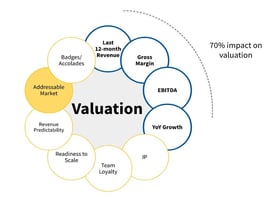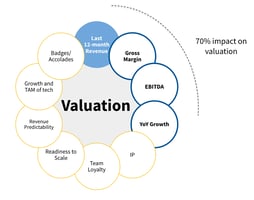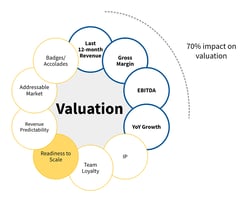Emerging Technology Services startups are specialist organizations. They focus on a particular...
Demystifying ETS valuations Part 10b (Last Part): Readiness to Scale
Our previous blog post talked about the ingredients that represent readiness to scale for an ETS firm. You can read it here. This blog post presents the second half of that blog post. As a quick refresher, Readiness to Scale represents how prepared an ETS firm is to scale to the next level. It is represented by six ingredients in our view:
-
A clear vision
-
Differentiated offer and Deep understanding of a growing target market
-
A working sales engine where input efforts and spending correlates with sales
-
Operational leadership that knows how to operate at scale
-
Processes that are well-documented, measured, and automated
-
Data-driven Decentralized Decisions
 Valuation Drivers
Valuation DriversRead our previous blog post that explains 1-3 from this list. We suggest that you read it first. This blog will explain 4-6 below.
4. Operational leadership that knows how to operate at scale: As the business grows, operational needs of the business grow with it. Oftentimes, these lessons are learned on the job, and that slows or prevents scaling. A leadership team that is seasoned to foresee the challenges and put systems and processes in place ahead of time prevents these plateaus. Choosing such leaders is often hard as the founders themselves do not know what to look for. At Vixul, we guide our founders to hire these seasoned leaders – when do they need someone, what type of person they need, what should they look for, and sometimes even connect them with people who can do it for them.
5. Processes that are well-documented, measured, and automated: Operational leadership, as stated above, is critical. The current state of operations also signals to an investor that the company has the foundation to scale. In services businesses, there are many processes. A good example is creating SOWs for clients, specific to their requirements. Nearly every investor/acquirer will ask how long it takes for you to give your customers an estimate (time to quote). Your answer can be, it depends (really weak answer), or it takes 1-2 weeks (ok answer), or it takes us 3 to 7 days depending on the size of the customer but the average is 3.8 days, and because shorter time to quote increases our win rates we have reduced time to quote from 4.5 days to 3.5 days in the last year and aspiring to bring it to 3.2 this year (ninja answer). This last answer puts you in a new category. Investing in this type of maturity of process is often neglected in the early days of the company as sales and delivery seem more important and putting serious time and thought in to streamlining operations seems like a waste, but eventually the lack of this investment at the right time inhibits growth in ways unforeseen by founders. At Vixul, Streamline Operations is one of the levers of the Vixul maturity framework and we help our startups understand the importance of certain processes and provide ready made blueprints for them to accelerate their maturity.
6. Data-driven Decentralized Decisions. A big difference between the modus operandi of big vs small companies is their focus on data. Amazon and Facebooks of the world lives by their data, and not by conviction and opinions. In ETS businesses, capturing the right data, accurately representing it, using it for decision making, and allowing mid-level leaders to make their own data-driven decisions really enhances the ability to scale. In every due diligence process for an investment/loan/acquisition, investors ask a lot of questions and the answers aren't just sought to get the numbers but to also learn if the data is being measured and available. Post-acquisition, one of the compliments we got for our last startup Flux7 was that we had the data available for the questions they asked. Building this type of data repositories and the culture to view them takes years – it's a journey, and nearly every startup in our Vixul cohort starts their journey with us by collecting data about their current and past clients. We try to teach the founders to live by data today, when it is still tractable at the small scale, so when the company is bigger, they have their data and the culture to use it.
When all or even some of these ingredients are in place, services organizations can not only scale, they can scale rapidly and gain revenue and enterprise value at the same time. As founders, always knowing where your bottlenecks to scale are and having soft goals to improve them continuously to achieve the next level is critical.
Contact us if you are an ETS founder and want to discuss how to scale your business. We will be happy to give advice as this is our passion!
The other articles in our "Demystifying ETS Valuations" series are:
-
Demystifying ETS Valuations Part 4: EBITDA and the rule of 40
-
Demystifying ETS Valuations Part 5: Intelectual Property
-
Demystifying ETS Valuations Part 6: Addressable Market
-
Demystifying ETS Valuations Part 7: Revenue Predictability
-
Demystifying ETS Valuations Part 8: Team Loyalty
-
Demystifying ETS Valuations Part 9: Badges And Accolades
-
Demystifying ETS Valuations Part 10a: Readiness To Scale
-
Demystifying ETS Valuations Part 10a: Readiness To Scale




